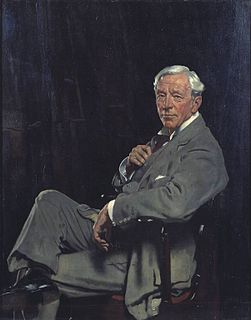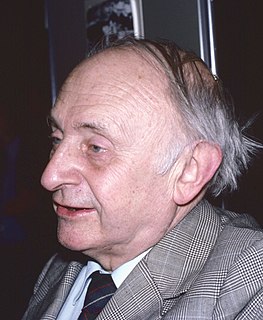Related Research Articles

Sir Frederick Gowland Hopkins was an English biochemist who was awarded the Nobel Prize in Physiology or Medicine in 1929, with Christiaan Eijkman, for the discovery of vitamins, even though Casimir Funk, a Polish biochemist, is widely credited with discovering vitamins. He also discovered the amino acid tryptophan, in 1901. He was President of the Royal Society from 1930 to 1935.

Prof Rodney Robert Porter, CH, FRS FRSE HFRCP was a British biochemist and Nobel laureate.

Arthur Kornberg was an American biochemist who won the Nobel Prize in Physiology or Medicine 1959 for his discovery of "the mechanisms in the biological synthesis of deoxyribonucleic acid (DNA)" together with Spanish biochemist and physician Severo Ochoa of New York University. He was also awarded the Paul-Lewis Award in Enzyme Chemistry from the American Chemical Society in 1951, L.H.D. degree from Yeshiva University in 1962, as well as National Medal of Science in 1979. In 1991, Kornberg received the Golden Plate Award of the American Academy of Achievement and the Gairdner Foundation Award in 1995.
Hugh Macdonald Sinclair, FRCP was a medical doctor and researcher into human nutrition. He is most widely known for claiming that what he called "diseases of civilization" such as coronary heart disease, cancer, diabetes, inflammation, strokes and skin disease are worsened by "bad fats".
Alfred James Ewart, FRS was an English-Australian botanist.
Philip Handler was an American nutritionist, and biochemist. He was President of the United States National Academy of Sciences for two terms from 1969 to 1981. He was also a recipient of the National Medal of Science.
Sir Philip Cohen FRS FRSE FMedSci is a British researcher, academic and Royal Medal winner based at the Medical Research Council Protein Phosphorylation and Ubiquitylation Unit, School of Life Sciences at the University of Dundee. During the 1990s he was the world's third most cited professor and has been described by Professor Garry Taylor of the University of St Andrews as "one of the world’s top scientists". and by Professor Sir Peter Downes as "arguably the UK's leading biochemist and an iconic figure in UK science". As of 2008 he has written over 470 peer-reviewed papers and given over 250 invited lectures in 33 countries, and has been repeatedly linked to a move of biotechnology companies to Dundee and the economic regeneration that came with it, to the point where 15% of the local economy is derived from biotech companies and their employees. His work has also seen Dundee attracting some of the world's best scientists, with over 1% of the world's most cited scientists residing in Dundee and fundraising of more than £35 million over the last 10 years to help attract them.

Benjamin Moore, FRS was an early British biochemist. He held the first chair of biochemistry in the UK, and founded the Biochemical Journal, one of the earliest academic journals in the subject.
James Norman Davidson CBE PRSE FRS was a Scottish biochemist, pioneer molecular biologist and textbook author. The Davidson Building at Glasgow University is named for him.
Alexander Thomas Cameron was a British-born Canadian biochemist. He was best known as Professor of Biochemistry at the University of Manitoba, and as the author of numerous popular biochemistry textbooks, including the Textbook of Biochemistry.
Prof Thomas Swale Vincent MD FRSE LLD was a British physiologist who spent most of his working life in Canada.
Muhammad Akhtar FRS is a British - Pakistani biochemist, and former Director General of the School of Biological Sciences, at the University of the Punjab.

Sir William Symington McCormick was a Scottish scholar and educational administrator.
Robert Campbell Garry DSc (1933) OBE FRSE LLD (1900–1993) was a British physician and Professor of Medicine at both St Andrews University and Glasgow University. During the Second World War, as an expert on human physiology, he advised on human tolerance of extreme weather conditions and forces, as experienced by high altitude pilots.

Diarmid Noël Paton,, known as Noël Paton, was a Scottish physician and academic. From 1906 to 1928, he was the Regius Professor of Physiology at the University of Glasgow.

Hamish Nisbet Munro FRSE (1915–1994) was a Scottish biochemist and expert in protein metabolism at Glasgow University and Massachusetts Institute of Technology. He served as president of the American Institute of Nutrition in 1978, and was first director of the USDA Human Nutrition Research Centre on Ageing at Tufts University.
Sir Michael Anthony John Ferguson CBE, FRS, FRSE is a British biochemist and Regius Professor of Life Sciences at the University of Dundee. His research team are based at the School of Life Sciences, University of Dundee.
Robert J. Cousins is an American nutritional biochemist who has researched the metabolism of heavy metals, especially zinc. He has served as president of the Federation of American Societies for Experimental Biology (FASEB) and the American Society for Nutrition (ASN). He was recognized with membership in the National Academy of Sciences in 2000 and served as editor of the Annual Review of Nutrition for ten years.
Frank William Ernest Gibson was an Australian biochemist and molecular biologist, Howard Florey Professor of Medical Research in the John Curtin School of Medical Research, and a Fellow of the Royal Society of London He undertook his most notable work at the University of Melbourne. He and his research group were responsible for the discovery of chorismic acid. He later worked at The Australian National University (ANU).
References
- 1 2 3 4 5 6 7 8 9 10 "UR-SF 34 Robert Percival Cook, Lecturer in Biochemistry, University College, Dundee and Queen's College, Dundee; Professor of Biochemistry, University of Dundee". Archive Services Online Catalogue. University of Dundee. Retrieved 4 June 2019.
- ↑ Brooks, C. J. W. (2004). "Cook, Robert Percival (1906–1989), biochemist : Oxford Dictionary of National Biography - oi" . Oxford Dictionary of National Biography (online ed.). Oxford University Press. doi:10.1093/ref:odnb/50971.(Subscription or UK public library membership required.)
- 1 2 "Robert Percival Cook (1906-1989) - University of Dundee Archives". archives.dundee.ac.uk.
- ↑ "Too many Cooks?". Archives, Records and Artefacts at the University of Dundee. University of Dundee. 18 March 2010. Retrieved 28 April 2017.
- ↑ C D Waterston; A Macmillan Shearer (July 2006). Former Fellows of The Royal Society of Edinburgh, 1783–2002: Part 1 (A–J) (PDF). Royal Society of Edinburgh . ISBN 090219884X. Archived from the original (PDF) on 24 January 2013. Retrieved 18 September 2015.